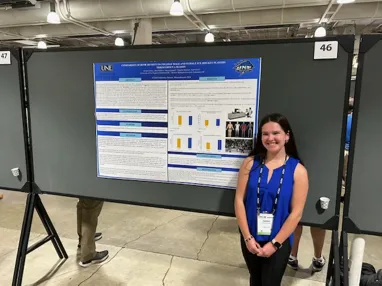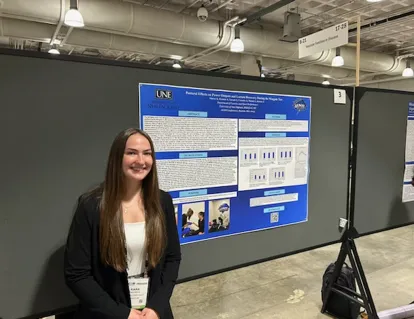Applied Exercise Science grads present at national sports medicine conference in Boston

Two recent graduates of the University of New England’s Bachelor of Science in Applied Exercise Science degree program presented at the national American College of Sports Medicine conference in Boston in May.
At the conference, Sarah Collins, B.S. ’24, gave a presentation titled “Comparison of Bone Density in College Male and Female Ice Hockey Players Throughout a Season.”
Previous literature has suggested that, during the sports season, bone density can decline. Collins’ research found no difference from pre- to post- season in a study of UNE’s ice hockey teams. However, she found the women’s team had a significantly lower bone density, supporting the need for women athletes to maximize their bone density during the period of peak growth.
Collins plans to complete additional scientific coursework before applying to graduate school for a pathology assistant degree.
Kiara Morse, B.S. ’24, gave a presentation titled “Postural Effects on Power Outputs and Lactate Recovery During the Wingate Test.”
The Wingate Test is a 30-second, all-out effort on a stationary bicycle used to measure the leg power of athletes who are engaged in sprint and power-type sports. Traditionally, the test has been performed with the athlete seated throughout the entire 30 seconds.
However, there are questions whether changing positions affect the results of the test. For example, if an athlete stands or performs a combination of sitting and standing during the test — as one might do on a typical outside bike ride — will the test results vary?
Morse’s analysis resulted in no difference in power output or lactic acid levels between each posture: seated, standing, and a combination of sitting and standing. These results support the belief that the Wingate Test can be performed in different postures without significant effects on the results.
Morse plans to complete additional scientific coursework to satisfy pre-requisite requirements to apply to medical school or a physician assistant degree program.

Sarah Collins

Kiara Morse